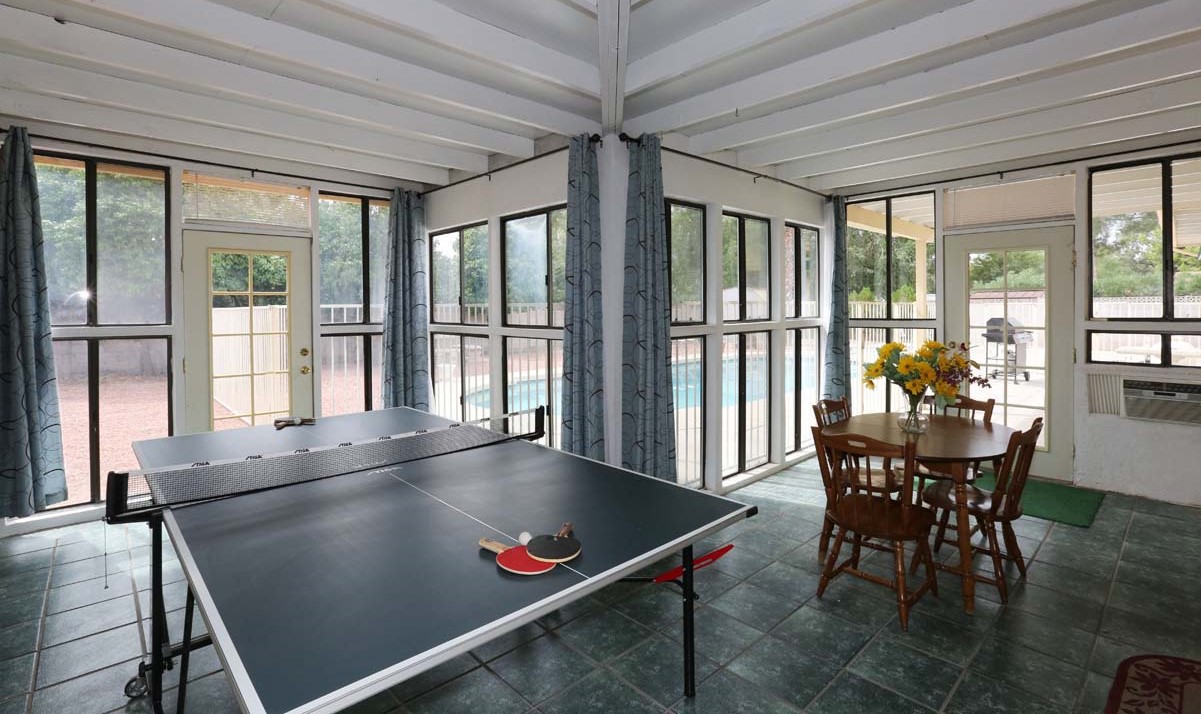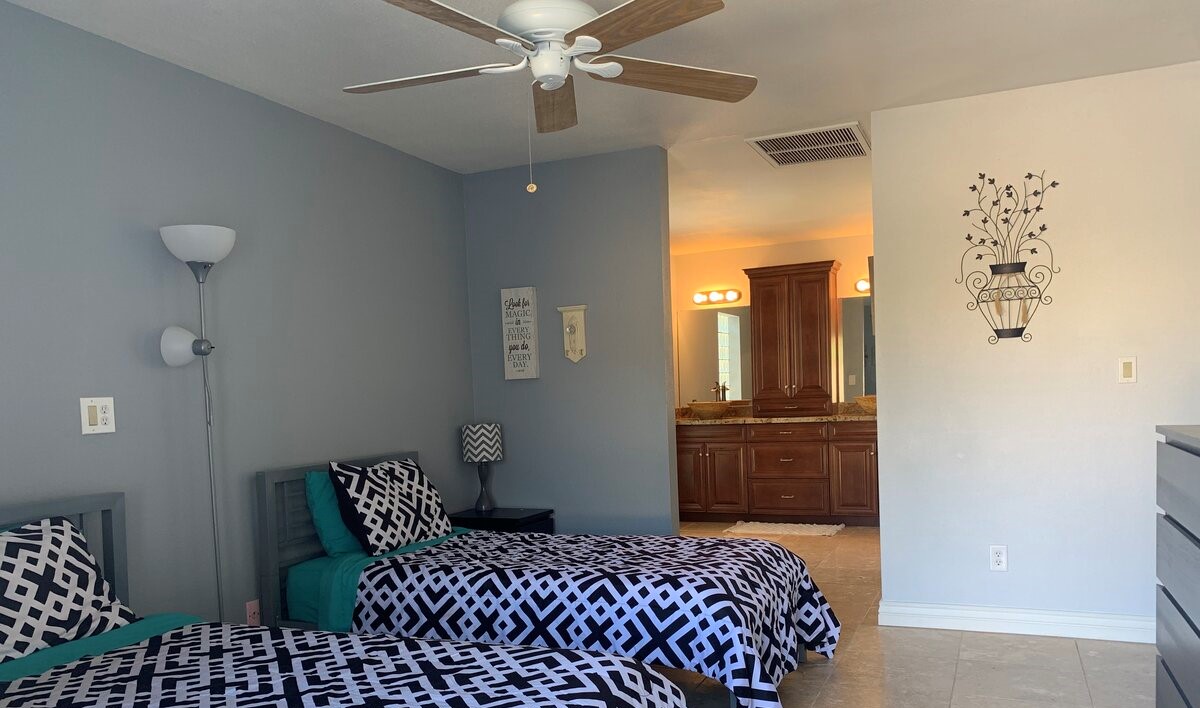The journey to sobriety often isn’t an easy one. For those who’ve experienced a drug or alcohol dependency, this probably seems obvious.
For that very reason, it’s important to have a strong support system while in recovery. This includes having professional resources at your disposal, as well as an environment that’s conducive to your recovery. If you remain surrounded by the same people who enabled your drug and alcohol use, even as you enter recovery, then it’s no surprise that long-term sobriety may be harder to achieve.
To get sober, you need to live sober. Living sober is far easier to accomplish when you’re surrounded by those who share and adhere to those same values. Living sober is a massive commitment, especially for those recovering from drug or alcohol dependence.
Sadly, it isn’t always a fantastic idea to return home for recovery. After all, you’re returning home to the same place where, presumably, you were previously engaging in substance-dependent behaviors. Plus, even outside your recovery, home life isn’t always easy. Sometimes, it’s packed full of different pressures and stresses, which could drive you to resort to drugs or alcohol as a coping mechanism. At the end of the day, this can increase a person’s risk of relapse.
That’s where sober living homes come into play, for those making the transition into intensive outpatient care.
What Is a Recovery Home?
Recovery homes, or sober living homes, are a valuable asset to those hoping to live sober and stay committed to their recovery. This is a form of transitional housing and allows individuals in recovery to remain independent, all while offering them a sober and structured home life.
When you live in sober housing, you’re living somewhere that’s free of temptations. Rather than having to come into contact with drugs or alcohol on a regular (or even occasional) basis, sober housing eliminates these distractions entirely.
Sober living homes are entirely substance-free environments, typically catering to a specific gender. While residing in a sober living facility, an individual can expect 24/7 access to support and guidance. These facilities also put in a strong effort to keep residents accountable in their recovery. This may include the use of urinalysis and random breathalyzers, for instance. Intensive outpatient attendance and participation are carefully tracked by the facility, pushing residents to remain dedicated to their recovery from drug or alcohol dependence.
Recovery homes also offer on-site medical care and are staffed by experienced professionals, including licensed clinical social workers and psychiatric nurses.
While attending our outpatient treatment program, you have the option of living in one of our sober living homes:
During the day you will attend classes, therapy and activities per your custom treatment program. Then, later in the evening, you’ll have a comfortable, fully sober living environment to return home to. The Sobriety Experience at Illuminate Recovery also offers a variety of amenities to its participants, including a pool, a computer office space, HD cable TV, and more.
Why Should I Go to Sober Living?

While living in sober housing as someone in intensive outpatient recovery, you’re immersing yourself in an environment suited to your unique recovery needs.
By eliminating your exposure to drugs and alcohol, as well as by cutting down on any real-life stress you may experience, sober housing decreases the risk of relapse. During the intensive outpatient portion of your recovery, transitional housing is valuable — after all, this is a transitional period of your recovery. You’re no longer depending on drugs or alcohol, but the temptation or desire likely hasn’t vanished in its entirety.
During this time, avoiding relapse may feel difficult. The more care and support you receive from those around you, the more likely you are to have a successful recovery. That is why sober housing is such a valuable resource for those recovering from drug or alcohol dependence.
The Benefits of Sober Housing While in PHP or IOP
As you probably already concluded, there is a wide variety of benefits to choosing sober housing, while in partial hospitalization or intensive outpatient care.
So, let’s review some of the wonderful benefits of a sober living home:
1. Never-Ending Guidance and Support
As a resident of a sober living facility, you’ll receive constant support toward your recovery. While you’re living in the facility, you can expect to be held accountable for your actions, all the time.
Maybe you’re experiencing an abrupt craving that you’re finding difficult to work past. Or maybe you’re just feeling stressed or overwhelmed, or maybe you’re experiencing troubles in your personal life. Whatever it is, you’ll have 24/7 access to care and support, whenever the need arises. If you ever need someone to lend an ear, then a trained professional will be available to help.
You may also be given the opportunity to learn from alumni and those who’ve previously experienced the program. If on-hand at the facility, these support staff members will know just what it’s like to go through recovery for substance dependence. They’ll also know exactly what recovery can be like, following rehab and a sober housing program. It can be highly useful to hear from the people who’ve walked in your shoes and have made it to the other side. If you’re ever looking for advice, then this is a fantastic place to turn, whether it’s in or outside of sober housing.
Rules are established within sober living housing, which are designed not to restrict the residents’ independence, but to keep tenants happy and sober. Continuously breaking housing rules could lead to removal from the facility, providing residents with a strong incentive to make the most of their treatment.
2. Meaningful Relationships, Based in Shared Sobriety

Perhaps one of the biggest benefits of residing in sober housing is that you’ll be able to bond with the other residents, leading to deep and meaningful relationships. Whether you’re in sober housing or another treatment setting, building these bonds with others is an obvious (and important) benefit.
While you’re staying in a sober living facility, you’ll meet a variety of new people, all of whom know what it’s like to be in recovery. These are individuals that share common ground and similar experiences with you, and you’ll be able to live right alongside them. This kind of support can be highly useful during recovery. Sometimes, it’s just good to have someone who truly understands what you’re going through — because they’re going through it as well.
The people living alongside you also understand what it’s like to crave drugs or alcohol. They know what it’s like to feel depressed or distant from the world and the people around them. They know what it’s like to feel a loss of self-control and to feel like they’ve disappointed or upset their loved ones. No doubt, these are all awful feelings. Not everyone understands what these experiences are like or how they can affect a person in the long term. However, most importantly, the individuals you’re living with also share your drive to recover, and to become healthier, happier versions of themselves — without the use of drugs or alcohol.
Loneliness is another common experience for those recovering from substance abuse. After all, this is an innate piece of the addiction cycle. Prior to beginning treatment, you likely cut people out of your life, including relationships that had once been positive. You probably felt isolated from those around you, as no one else seemed to understand what you were experiencing. Fearing rejection or judgment, you may have even withdrawn from family or loved ones.
Unfortunately, this sense of loneliness and isolation doesn’t always fade upon entering recovery. Living in a sober housing facility can help to fight loneliness, as you’re surrounded by individuals who understand and support you.
Relationships built in recovery are often highly meaningful. The individuals you share housing with may even begin to feel like family. Most likely, the relationships you build in sober housing will last beyond your time in the facility. Sometimes, these can even turn into lifelong friendships. You’ll be able to build a support system of people to turn to when recovery gets tough, even after you’ve left sober housing. These are individuals who will be able to continue holding you accountable, in the future — and you can do the same for them in return.
A sober network community is an invaluable resource to those in any stage of recovery.
3. Restoring the Life Skills You Lost to Substance Dependency
A dependency on drugs or alcohol can run a bulldozer over someone’s life, in many ways. That person’s other obligations are forgotten about, due to drugs or alcohol becoming a priority. Maybe you stopped eating well or stopped exercising. Maybe your home used to be perfectly clean, but now it’s a mess. Substance dependency can even make personal hygiene seem far less important.
Thanks to the structure provided by sober housing, you can begin to re-establish a routine. Transitional recovery allows you to begin developing (or re-developing) healthy habits, leading to an overall healthier, more stable lifestyle. Get back into the routine of doing laundry or begin a job search. Sober living is a wonderful time to work on restoring these important life skills.
In recovery, it’s important to regain a sense of personal responsibility. You may need to work on interpersonal skills, financial skills, or other practical skills used to take care of yourself and participate in daily life. Sober housing provides just the right balance of independence and structured support, in order to foster life skill development.
4. Lower Risk of Relapse
The overall goal of a sober housing facility is to provide a supportive, safe place for healing — without all the outside pressures and stresses. Thanks to this separation, you’ll be given the unique opportunity to truly focus on yourself and your recovery. No potential temptation from drug-using friends, places you used to hang out, or any other environmental triggers for relapse.
Substance abuse causes long-lasting changes within your brain. Even your brain cells function differently, as a result of drug or alcohol dependency. This eventually leads to difficulties with self-control. It also leads to impaired decision-making skills.
It’s been shown that, in individuals who relapse, a smaller amount of brain tissue exists in the area of the brain that regulates emotional control and behavior. This leads the person to struggle with resisting temptations, allowing them to make decisions that probably wouldn’t be considered “rational,” by outsiders. In the early stages of someone’s recovery, this can be especially difficult to contend with.
Thankfully, sober housing aims to get rid of relapse triggers, eliminating a person’s likelihood of relapse. At this point in recovery, a relapse trigger can make all the difference between sobriety and substance use.
The Sobriety Experience: Sober Living in Scottsdale, Arizona

Interested in sober housing, as a component of your IOP experience? At Illuminate Recovery, we offer upscale sober living facilities for both men and women. Our Scottsdale, Arizona facilities are designed to ensure a safe and sober environment for residents.
Whether you’re staying in Charter House or Amethyst House, you’ll receive 24/7 access to care and support. Recovery isn’t easy, and we’re devoted to providing residents with the support they deserve.
Interested in learning more about The Sobriety Experience at Illuminate Recovery? Contact us using our secure online form. We look forward to becoming a part of your recovery journey!




